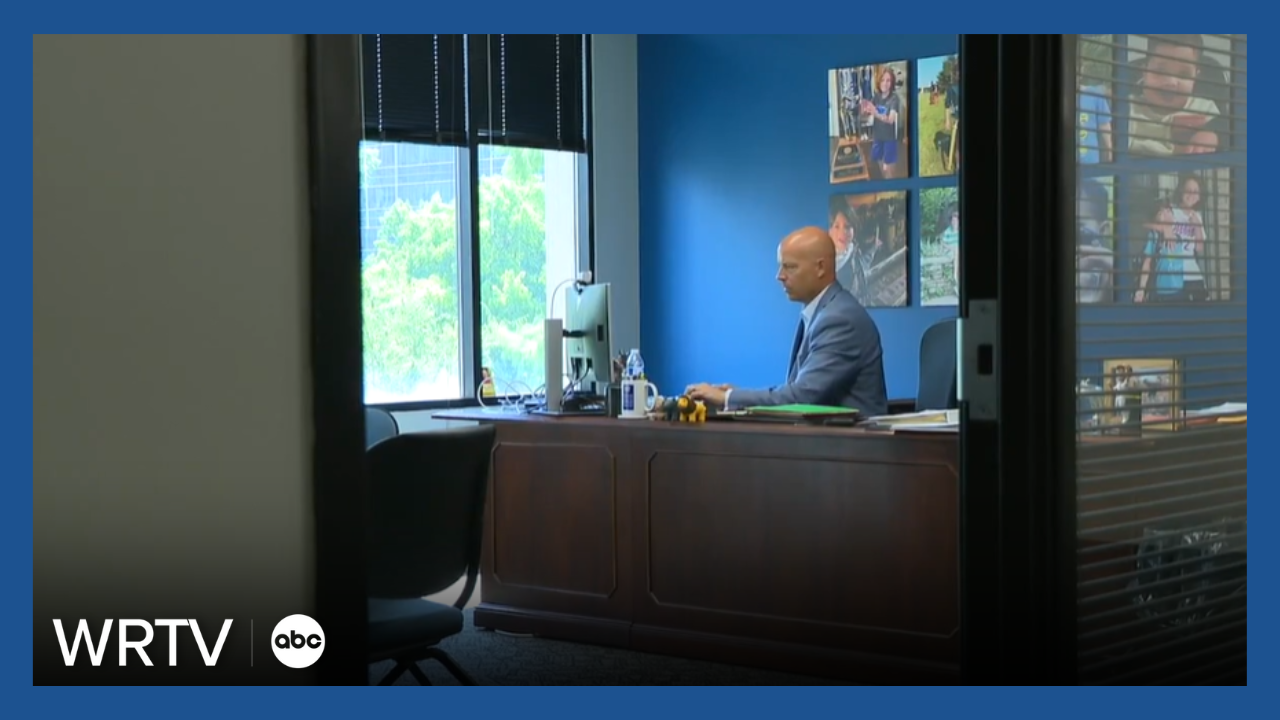INDIANAPOLIS — The new director at the Indiana Department of Child Services (DCS) wants to improve transparency and how the agency shares information with the public.
Governor Mike Braun appointed Adam Krupp to DCS director in January 2025.
WRTV Investigates sat down with Krupp to talk about what he’s accomplished in six months on the job, and what he’s planning to change within the agency.

New director looks at improving transparency
Currently, the Indiana Department of Child Services puts out an annual child fatality report, but there’s a significant lag time.
For example, DCS released the 2023 report in January 2025, which revealed that 56 children died from abuse and neglect.
Plus, Indiana is one of the strictest states when it comes to confidentiality, meaning people are often unaware of the things DCS is doing or not doing to protect children.
“We do get dragged through the mud at times,” said Krupp. “I would love to see us say more. I would love our ability to be transparent. The laws hold us back in many cases, and we are simply bound in some cases. There is criminal liability if we disclose information when folks like you are begging to have."
House Bill 1152 would have required:
- DCS to disclose whether it received calls to the state hotline before a child’s death.
- DCS to provide a public summary report within 90 days of completing the report for cases involving a child fatality or near fatality.
The bill failed to get a hearing in the Indiana Senate, which killed the bill in 2025.
Adam Krupp says he’s open to finding ways for DCS to share information with the public.
"Let’s come up with a collaborative solution that’s reasonable,” said Krupp. “So that we don’t put even more pressure on an already strained budget."
“It raises an eyebrow”: Krupp discusses the cost of child welfare
Child welfare is incredibly expensive.
DCS investigates child abuse and neglect and provides services to families.
The DCS budget for FY2026 is $1.54 billion, up from $1.49 billion in FY25, according to the agency.

The National Coalition for Child Protection Reform ranked Indiana ninth highest in the country for spending.
“When you look at the costs of child welfare, I think it raises an eyebrow,” said Krupp. “So our team has said we’re gonna look at that."
Krupp said costs have certainly risen over the last five years.
“We do need to take a look at how our services are paid for,” said Krupp. “Maybe we are offering way too many and not the right service. That will have a direct impact on cost for DCS. Every family that comes into contact with us, there’s a price tag.”
Improving family case manager turnover
Krupp says he’s working to change the culture for the 4,000 workers at DCS, many of whom experience stress and burnout.
In our WRTV Investigates special, “Kids in Our Care: Pressing for Change”, we told you that in fiscal year 2024, the turnover rate was 37% among family case managers, up from 33% in 2023.
WRTV Investigates asked Krupp what the current turnover numbers are.
“Our turnover rate is still in the same range,” said Krupp. “We simply haven’t had enough time to make a meaningful impact on that."
Krupp said he’s been working to improve retention and turnover by meeting with family case managers across the state.
“I’ve been to 54 offices and sat down with our staff, and I have many more to go,” said Krupp.

Krupp says since he took office, they’ve filled more than 100 family case manager positions.
As part of Project Awaken, DCS whittled its 18 geographic regions down to 5.
PREVIOUS | Indiana launches Project Awaken to transform Dept of Child Services
"We removed layers of upper management,” said Krupp. “We eliminated some things from the back office so we could focus our efforts and our resources to the front office. I’m much closer to the family case managers who are working on the front lines than I was in January, by several layers of management.”
“We want to keep families together”: Krupp discusses reunification
A permanent safe home can mean reunification with the birth parents, legal guardianship, or adoption.
Data obtained by WRTV Investigates shows the majority of cases end in reunification.
As of July 2025, 68% ended in reunification, 10.4% resolved in guardianship and 21.5% were adoptions.
WRTV Investigates has heard numerous complaints that reunification can come at the detriment of the child’s safety.
"It's reunification over everything,” said former DCS caseworker Moriah Coons. “I felt like children were getting hurt in the process."
Krupp said legally, they are required to put forth reasonable efforts to preserve and reunify children with their families.
“From day one, I’ve told our staff we want to keep families together,” said Krupp. "When do we enter the picture? When it’s unsafe, we take action."

“I’ve done a lot of observing, listening, and actually looking at cases,” said Krupp. “My perspective since January is we are doing what’s in the best interests of this child.”
Krupp points to numbers like the average number of days a child spends in foster care, 449—it’s lowest point in a decade.
"I believe that’s because of the things we’ve been doing with our culture,” said Krupp. “The stronger the culture we have, the safer kids are going to be.”






